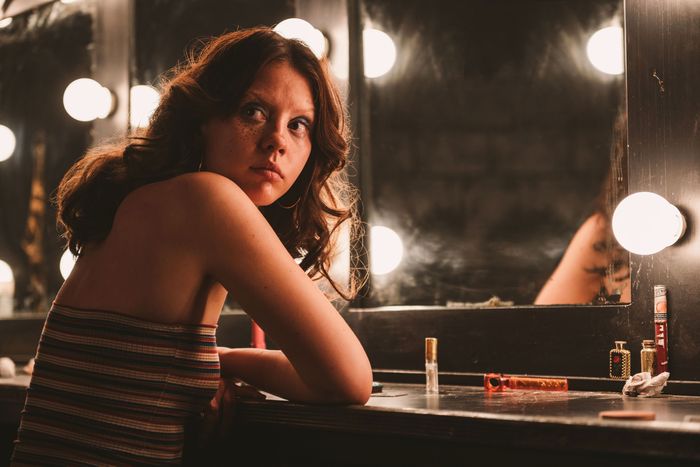
X begins with a group of bohemian young people, led by would-be impresario Wayne (Martin Henderson), driving out of town to shoot a porno. This is a bad idea when you’re in a slasher, but the aspiring adult-film stars — the bombshell Bobby-Lynne (Brittany Snow), the well-endowed Vietnam vet Jackson (Scott Mescudi), and Wayne’s fame-hungry girlfriend, Maxine (Mia Goth) — haven’t had a chance to realize how little a chance they have at survival. It’s 1979, a year before Friday the 13th came out, and over a decade and a half before Matthew Lillard would lay out the rules to making it out of a horror movie alive, with number one being “sex equals death.” That said, if any of them had seen The Texas Chain Saw Massacre, which hit theaters in the fall of 1974, they’d be at least a little leery about piling into a van and heading to a remote farmhouse in an economically depressed swatch of rural Texas. They pass a gruesome roadkill incident on the road, and then the owner of the property, a decrepit man named Howard (Stephen Ure), greets them with a shotgun before being reminded he’d agreed to rent out the building. If you’re going to stick around after that, any slaughter that follows is really your own damn fault.
X, a prettily constructed new movie from writer-director Ti West, doesn’t deal directly in the metafictional commentary of Scream or The Cabin in the Woods. But it is very much about the traditions of horror movies — in particular, the conservative moralizing at the core of slasher stereotypes, where fucking and drinking and drug use are inevitably punished with gruesome ends, and final girls are bastions of purity. By the standards of the genre, all of the characters in the movie should be doomed, even aspiring auteur RJ (Owen Campbell), who works the camera while his girlfriend, Lorraine (Jenna Ortega), who’s reluctantly accompanied him, handles sound. And yet even as menace simmers in the rural location, and violence threatens to erupt from somewhere, the movie never condemns the libertinism of its main characters. Despite RJ’s insistence that he’s going to include avant-garde techniques — “It is possible to make a good dirty movie!” he tells Lorraine — the film they’re making, The Farmer’s Daughters, doesn’t look like it’s going to revolutionize the industry. But the participants are all enthusiastic, sure that mainstream acceptance of porn is just around the corner, maybe with the arrival of the home-video market.
“We turn folks on, and it scares them,” one of the characters says as they unwind after a day of shooting. But despite a fire-and-brimstone style preacher sermonizing on television sets in the background, what fuels X is as much jealousy as it is a fear of sexuality. When someone does eventually die, it’s at the hands of Wayne’s wife, Pearl, who’s also played by Goth, in old-age makeup, and who spies on the group from the shadows, gazing covetously at their young bodies and lusty lovemaking. Pearl, who was a dancer when she was younger, once basked in what she describes to Maxine as “the power of beauty,” and resents finding herself rendered sexless and invisible by time. The blood is a while in coming, but it arrives in gouts once it does, as though a seal needed to be broken.
West, who hasn’t made a movie since 2016’s In a Valley of Violence, occupies an awkward netherworld between mainstream horror and the so-called “elevated” variety. He’s known for the deliberate pacing of his work, for drawing out anticipation of the thrill with long scenes of characters moving through spaces that seem at any moment ready to reveal something terrible. Like most of West’s films, X is not particularly ambitious in its psychology or storytelling. It’s his technique that makes his work feel like it has one foot in the arthouse, with its elegant compositions and the way the camera moves as though daring us to see something the characters have yet to spot. The most spectacular sequence in the film doesn’t involve knives and murderous couples at all, but a spontaneous skinny dip in a pond that happens to contains some alligators. We see Maxine from high above as she floats in the water and then languidly starts making her way back to the dock, unaware that she’s being pursued by a deadly creature, and oblivious to the danger she narrowly avoids.
Goth, with her off-kilter Kewpie doll appeal, is both an unexpected and a perfect fit for Maxine. As Bobby-Lynne, Snow plays the more conventional beauty, but Goth is able to project a heavy-lidded lewdness that makes you understand why everyone around Maxine thinks she has the potential to be a star. “You’re a fucking sex symbol,” she tells herself in the mirror at the start of the film, though it’s less a pep talk than her stating something she feels should be obvious. She’s the anti-final girl, comfortable in her sensuality and indifferent to the forces that would have her feel ashamed. She’s good enough for her double role to feel like a letdown in the degree to which it leans into a whole other sort of horror cliché by coloring old age as grotesque. Pearl, who’s the subject of a prequel West shot on the sly after wrapping X, is treated as pathetic, putting crusty makeup on a ghoul-like face and trying to entice her unwilling husband to have sex with her. The idea of elderly characters coupling becomes a gross-out gag, as though feeling desire were a ridiculous thing in bodies no longer deemed desirable. For all of X’s sex positivity, what actually scares the film is turning folks off.
More Movie Reviews
- The Accountant 2 Can Not Be Taken Seriously
- Another Simple Favor Is So Fun, Until It Gets So Dumb
- Errol Morris Has Been Sucked Into the Gaping Maw of True Crime


